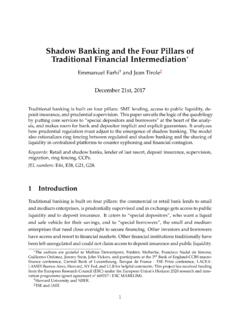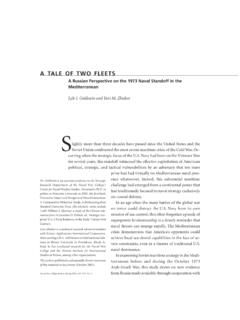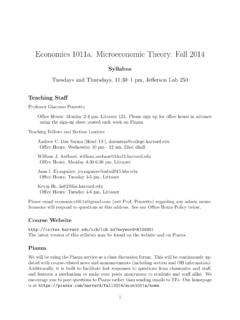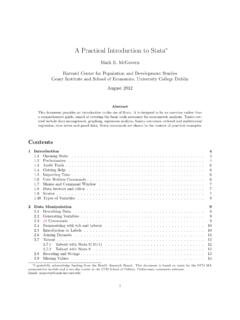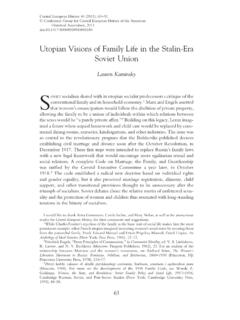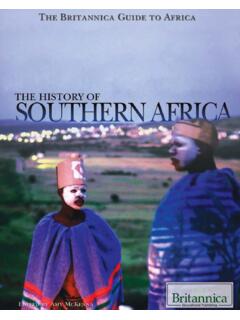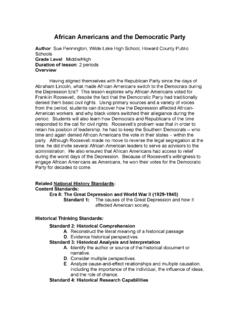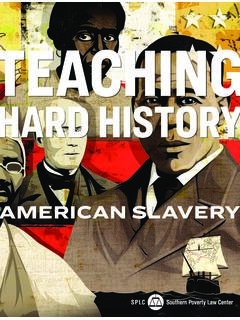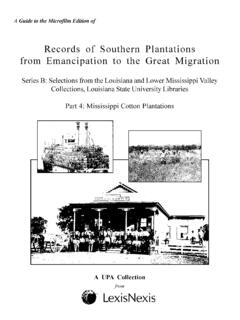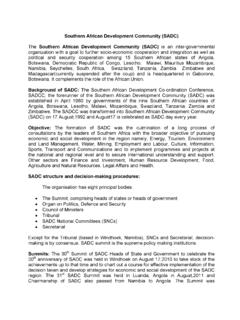Transcription of The Political Legacy of American Slavery
1 The Political Legacy of American SlaveryAvidit Acharya, Stanford UniversityMatthew Blackwell, Harvard UniversityMaya Sen, Harvard UniversityWe show that contemporary differences in Political attitudes across counties in the American South in part trace theirorigins to Slavery s prevalence more than 150 years ago. Whites who currently live in southern counties that had highshares of slaves in 1860 are more likely to identify as a Republican, oppose affirmative action, and express racial re-sentment and colder feelings toward blacks. We show that these results cannot be explained by existing theories, in-cluding the theory of contemporary racial threat.
2 To explain the results, we offer evidence for a new theory involvingthe historical persistence of Political attitudes. Following the Civil War, southern whites faced Political and economicincentives to reinforce existing racist norms and institutions to maintain control over the newly freed african Americanpopulation. This amplified local differences in racially conservative Political attitudes, which in turn have been passeddown locally across thefirst 250 years of American history, white land-owners, predominantly from the South, enslaved mil-lions of individuals of african descent.
3 This peculiarinstitution, as it was sometimes called, defined the social,economic, and Political landscape of the American Souththroughout this period. Slavery was so crucial to the Souththat one Georgia newspaper editor wrote, Negro Slavery isthe South, and the South is negro Slavery (cited in Faust1988, 60). Yet, despite Slavery s prominence in shaping Amer-ican history, and despite volumes written by economists andhistorians on its consequences, Political scientists have largelyoverlooked how American Slavery and the events followingits abolition could continue to influence the South s con-temporary politics.
4 Given recentfindings on the long-termconsequences of past events and institutions (Acemoglu,Garc a-Jimeno, and Robinson 2012; Dell 2010; Nunn andWantchekon 2011; Voigtl nder and Voth 2012), it would besurprising if such a fundamental aspect of American historyhad no persistent impact on American this paper, we show that the local prevalence ofslavery an institution that was abolished 150 years ago has a detectable effect on present-day Political attitudes inthe American South. Drawing on a sample of more than40,000 southern whites and historical census records, weshow that whites who currently live in counties that hadhigh concentrations of slaves in 1860 are today on averagemore conservative and express colder feelings toward Af-rican Americans than whites who live elsewhere in theSouth.
5 That is, the larger the number of slaves per capita inhis or her county of residence in 1860, the greater theprobability that a white Southerner today will identify as aRepublican, oppose affirmative action, and express attitudesindicating some level of racial resentment. We show thatthese differences are robust to accounting for a variety offactors, including geography and mid-nineteenth-centuryeconomic and social conditions. These results strengthenwhen we instrument for the prevalence of Slavery usinggeographic variation in cotton-growing consider several explanations for our results rootedin contemporary forces andfind each to be inconsistentwith the empirical evidence.
6 For example, we consider thepossibility that whites are simply more racially conservativewhen exposed to larger black populations the centralfinding of the literature on racial threat (Blalock 1967;Avidit Acharya is an assistant professor at Stanford University, Stanford, CA 94305; web: ~avidit. MatthewBlackwell is an assistant professor at Harvard University, Cambridge, MA 02138; web: MayaSen is an assistant professor at Harvard University, Cambridge, MA 02138; web: and supporting materials necessary to reproduce the numerical results in the paper are available in theJOPD ataverse ( ).)
7 An online appendix with supplementary material is available at Journal of Politics, volume 78, number 3. Published online May 19, 2016. by the southern Political Science Association. All rights reserved. 0022-3816/2016/7803-0001$ content downloaded from on June 15, 2016 06:28:11 AMAll use subject to University of Chicago Press Terms and Conditions ( ).Blumer 1958; Key 1949). However, when we estimate thedirect effect of Slavery on contemporary attitudes (Acharya,Blackwell, and Sen, forthcoming), wefind that contempo-rary shares of the black population explain little of Slavery seffects.
8 We also test various other explanations, includingthe possibility that Slavery s effects are driven exclusively bytwentieth-century population shifts or income inequalitybetween african Americans and whites. Wefind no evi-dence that these contemporary factors and theories of pop-ulation sorting fully account for our results. Introducingindividual-level and contextual covariates commonly used inthe public opinion literature also does not explain away explain our results, we instead propose a theory ofthe historical persistence of Political attitudes. The evidencesuggests that regional differences in contemporary white at-titudes in part trace their origins to the late slave period andthe time period after its collapse, with prior work suggest-ing that the fall of Slavery was a cataclysmic event that un-dermined southern whites Political and economic example, Du Bois (1935), Foner (2011), and Key (1949),among others, have argued that the sudden enfranchisementof blacks was politically threatening to whites, who for cen-turies had enjoyed exclusive Political power.
9 In addition, theemancipation of southern slaves undermined whites eco-nomic power by abruptly increasing black wages, raising la-bor costs, and threatening the viability of the southern plan-tation economy (Alston and Ferrie 1993; Ransom and Sutch2001). Taken in tandem with massive preexisting racial hos-tility throughout the South, these Political and economicchanges gave southern Black Belt elites an incentive to fur-ther promote existing anti-black sentiment in their local com-munities by encouraging violence toward blacks and racistattitudes and policies (Roithmayr 2010). This amplified thedifferences in white racial hostility between former slave-holding areas and non-slaveholding areas and intensifiedracially conservative Political attitudes within the Black have been passed down locally, one generation to provide empirical support for this mechanism byshowing that areas of the South that were the earliest toeliminate the Political and economic incentives for anti-blackviolence for example, by adopting new technologies, suchas tractors.
10 That reduced the demand for black farm labor are also the areas in which Slavery s long-term effects havemost attenuated. Furthermore, as evidence for intergenera-tional (cultural) transfer of attitudes, we show that there existsa strong correlation between the racial attitudes of parents andtheir children in the US South. Our evidence, therefore, sup-ports the theory that Political attitudes have persisted histor-ically in the US South, rather than the view that attitudesare driven exclusively by contemporaneous forces makingour position quite distinct from much of the existing publicopinion paper proceeds as follows.


